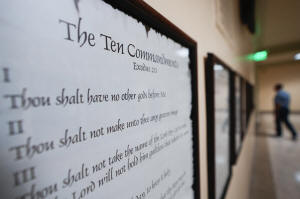Some US lawmakers want more Christianity in the classroom. Trump could
embolden their plans
 Send a link to a friend
Send a link to a friend
 [January 11, 2025]
By MORIAH BALINGIT [January 11, 2025]
By MORIAH BALINGIT
WASHINGTON (AP) — Conservative lawmakers across the U.S. are pushing to
introduce more Christianity to public school classrooms, testing the
separation of church and state by inserting Bible references into
reading lessons and requiring teachers to post the Ten Commandments.
The efforts come as President-elect Donald Trump prepares to take office
pledging to champion the First Amendment right to pray and read the
Bible in school, practices that are already allowed as long as they are
not government-sponsored.
While the federal government is explicitly barred from directing states
on what to teach, Trump can indirectly influence what is taught in
public schools and his election may embolden state-level activists.
Trump and his fellow Republicans support school choice, hoping to expand
the practice of using taxpayer-funded vouchers to help parents send
their children to religious schools.
But there is a parallel push to incorporate more Christianity into the
mainstream public schools that serve the overwhelming majority of
students, including those of other faiths. And with the help of judicial
appointees from Trump's first presidential term, courts have begun to
bless the notion of more religion in the public sphere, including in
schools.

“The effect of even Trump being the president-elect, let alone the
president again, is Christian nationalists are emboldened like never
before,” said Rachel Laser, the president and CEO of Americans United
for Separation of Church and State.
Large numbers of Americans believe the founders intended the U.S. to be
a Christian nation. A smaller group, part of a movement widely called
Christian nationalism, champions a fusion of American and Christian
identity and believes the U.S. has a mandate to build an explicitly
Christian society.
Many historians argue the opposite, claiming the framers created the
United States as an alternative to European monarchies with official
state churches and oppression of religious minorities.
Efforts to introduce more Christianity into classrooms have taken hold
in several states.
In Louisiana, Republicans passed a law requiring every public school
classroom to post the Ten Commandments, which begin with “I am the Lord
thy God. Thou shalt have no other gods before me.” Families have sued.
In Texas, officials in November approved a curriculum intertwining
language arts with biblical lessons. And in Oklahoma, the state
superintendent of education has called for lessons to incorporate the
Bible from grades 5 through 12, a requirement schools have declined to
follow.
Utah state lawmakers designated the Ten Commandments as a historic
document, in the same category as the Declaration of Independence and
the Constitution, so teachers could post it in their classrooms. Many
other states have seen legislation that would put them in more
classrooms. And attorneys general from 17 GOP-led states recently filed
a brief supporting Louisiana's Ten Commandments mandate.
Schools are permitted — and even encouraged — to teach about religion
and to expose students to religious texts. But some say the new measures
are indoctrinating students, not educating them.
Critics have raised concerns also about proliferating lesson plans. Some
states have allowed teachers to use videos from Prager U, a nonprofit
founded by a conservative talk show host, despite criticism that the
videos positively highlight the spread of Christianity and include
Christian nationalist talking points.
During his first administration, Trump commissioned the 1776 Project, a
report that attempted to promote a more patriotic version of American
history. It was panned by historians and scholars who said it credited
Christianity for many of the positive turns in U.S. history without
mentioning the religion's role in perpetuating slavery, for example.
[to top of second column]
|

A copy of the Ten Commandments is posted along with other historical
documents in a hallway of the Georgia Capitol, June 20, 2024, in
Atlanta. (AP Photo/John Bazemore, File)

The project was developed into a curriculum by the conservative
Hillsdale College in Michigan and is now taught in a network of
publicly funded charter schools supported by the college. It also
has influenced state standards in South Dakota.
Challenges to some state measures are now working their way through
the courts, which have grown friendlier to religious interests
thanks to Trump's judicial appointments.
In 2022, the Supreme Court ruled in favor of a football coach in
Washington state who was fired for praying with players at midfield
after a game, saying the school district infringed on his rights to
religious expression. Dissenting justices noted some players felt
pressure to join the coach. But the high court said a public school
can't restrict an employee's religious activity just because it
could be construed as an endorsement of religion, reversing a
five-decade precedent.
The ruling could pave the way for conservatives to introduce more
Christianity in public schools, said Derek Black, a law professor at
the University of South Carolina.
“Donald Trump’s judicial appointees have emboldened states” to test
the separation of church and state, he said.
In the wake of the football coach's case, courts now analyze
church-state separation through the lens of history, said Joseph
Davis of Becket, a public interest law firm focused on religious
freedom that is defending Louisiana over its Ten Commandments
mandate.
The Supreme Court has endorsed the idea that “it’s OK to have
religious expression in the public spaces," Davis said, "and that we
should sort of expect that ... if it’s a big part of our history.”
Critics say some measures to introduce more historical references to
Christianity in classrooms have taken things too far, inserting
biblical references gratuitously, while erasing the role
Christianity played in justifying atrocities perpetuated by
Americans, like genocide of Native people.
These are among the criticisms facing the new reading curriculum in
Texas. Created by the state, districts aren't required to use it,
but they receive financial incentives for adopting it.
“The authors appear to go out of their way to work detailed Bible
lessons into the curriculum even when they are both unnecessary and
unwarranted,” religious studies scholar David R. Brockman wrote in a
report on the material. “Though religious freedom is vital to
American democracy, the curriculum distorts its role in the nation’s
founding while underplaying the importance of other fundamental
liberties cherished by Americans.”
Texas Values, a conservative think tank that backed the new reading
curriculum, said in a statement that the court's pivot toward
permitting more Christianity in schools, and allowing more taxpayer
money to flow to religious institutions, is corrective.
The football coach case has rightfully returned protections for
religion and free speech in public school, said Jonathan Saenz, the
Texas Values president.
“Voters and lawmakers (are) getting tired of the attacks on God and
our heritage of being ‘One Nation Under God,'” he said.
___
Associated Press writers Sara Cline, Kimberlee Kruesi and Peter
Smith contributed.
All contents © copyright 2024 Associated Press. All rights reserved
 |